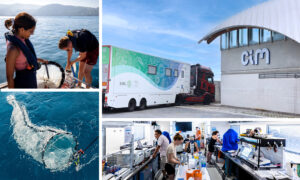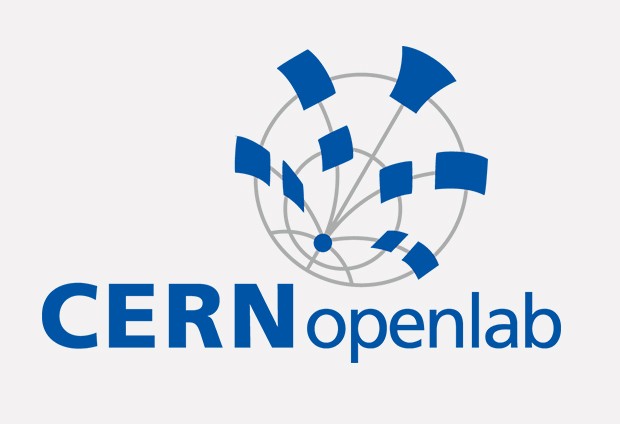
EMBL-EBI joins CERN openlab
CERN openlab welcomes EMBL-EBI as one of its first non-commercial partners, collaborating on future challenges in ICT.

CERN openlab, a unique public-private partnership between CERN and leading ICT companies, is entering a new phase and is expanding to include EMBL-EBI and other public research organisations. A special event was held at CERN on 10 June to mark this occasion.
CERN openlab’s mission is to accelerate the development of innovative ICT solutions that help the increasingly data-driven scientific community. CERN’s Large Hadron Collider (LHC), one of the most complex machines ever built, requires cutting-edge ICT to control its operations and analyse the vast amounts of data produced by high-energy physics experiments. During Run 2 of the LHC, it is expected that the CERN Data Centre will store more than 30 petabytes of data every year from LHC experiments, which is equivalent to about 250 years of high-definition video. To date, the CERN Data Centre has stored over 100 petabytes of data. EMBL-EBI’s data centres have 60 petabytes of capacity, doubling on average each year, and host a rapidly growing volume of life-science data produced in DNA sequencing and other experiments.
By pooling our knowledge and expertise, we aim to address the common challenges faced by large-scale research laboratories in the era of big data
Testing in CERN’s demanding environment provides CERN openlab companies with valuable insights into their products’ performance, at the same time providing CERN with access to potentially useful technologies in their early stages of development.
“CERN openlab plays a vital role in ensuring that members of CERN’s scientific community have access to the very latest ICT solutions to help them do their ground-breaking work and further our understanding of the universe,” says Alberto Di Meglio, Head of CERN openlab. “CERN openlab also aids innovation by enabling continuous exchange of information and expertise between research and industry. Technologies targeted at the needs of CERN today are likely to become mainstream products for enterprise — or even consumer markets — just a few years down the line.”
Huawei, Intel, Oracle, and Siemens are all partner companies for the new phase of CERN openlab. Brocade, Cisco, IDT, Rackspace, and Seagate are contributors, while Yandex is an associate member. EMBL-EBI and the GSI Helmholtz Centre for Heavy Ion Research are the first public research organisations to join.
“We are constantly scaling up our infrastructure in response to the incredibly rapid growth of biological data, particularly in genomics,” explains Ewan Birney, Associate Director of EMBL-EBI, which provides freely available molecular data to the scientific community. “We collaborate extensively with scientists and engineers all over the world to find solutions to these challenges – and to present them as real opportunities to our many users. Being part of CERN Openlab opens up lots of interesting possibilities for collaboration, and I’m very much looking forward to seeing how this develops.”
“We’ve been expanding our cloud-based activities, and as part of ELIXIR we’re always looking for new, efficient ways to share the load of managing rapidly growing life-science data resources amongst different institutes and countries,” explains Steven Newhouse, head of Technical Services and Embassy Cloud at EMBL-EBI. “CERN openlab will help us work with Rackspace to deploy open cloud technology so that many organisations can offer a single point of entry to several public databases. If we’re successful, it will be much easier for people to make the best use of public databases, wherever they may be hosted.”
“Our expansion to include other public research organisations makes this a very exciting time for us all,” adds Di Meglio. “By pooling our knowledge and expertise, we aim to address the common challenges faced by large-scale research laboratories in the era of big data.”
About CERN Openlab
CERN openlab was created in 2001 and is now entering its fifth three-year phase (2015-2017). This phase addresses new topics crucial to the CERN scientific programme. The topics have been defined over the past 18 months, through discussion and collaborative analysis of requirements between the companies collaborating in CERN openlab and representatives of both CERN and the LHC experiments.
About CERN
CERN, the European Organization for Nuclear Research, is the world’s leading laboratory for particle physics. It has its headquarters in Geneva. At present, its member states are Austria, Belgium, Bulgaria, the Czech Republic, Denmark, Finland, France, Germany, Greece, Hungary, Israel, Italy, the Netherlands, Norway, Poland, Portugal, Slovakia, Spain, Sweden, Switzerland and the United Kingdom. Romania is a Candidate for Accession. Serbia is an Associate Member in the pre-stage to Membership. Turkey is an Associate Member. India, Japan, the Russian Federation, the United States of America, the European Union, JINR and UNESCO have observer status.
This post was originally published on EMBL-EBI News.


